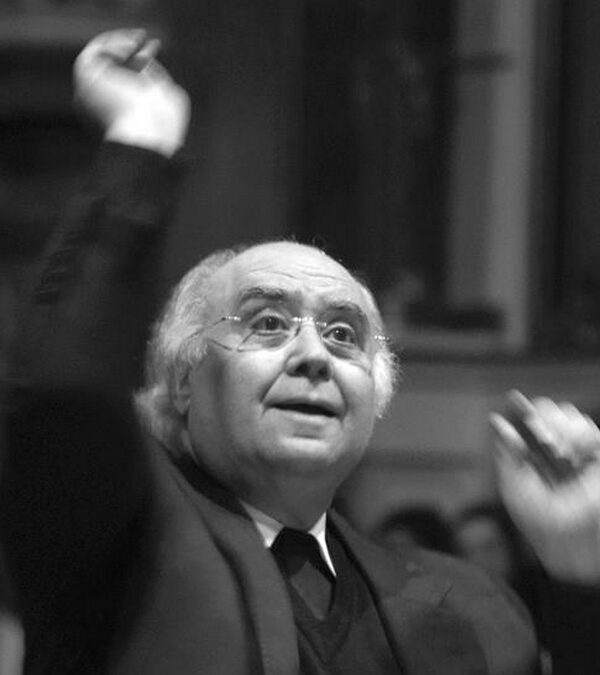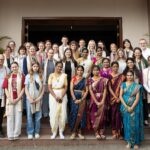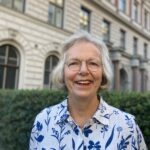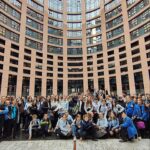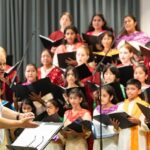Musical service at Mass – Tribute to Cónego António Ferreira dos Santos
On October 26, Sunday, at Ig. Lapa, in Porto, two choirs of young singers from the Porto region – Pueri Cantores de São Cristóvão de Ovar and the Children’s and Youth Choir of the Parish of Beiriz – joined the Lapa Polyphonic Choir for a musical service at Sunday Mass in tribute to Cónego António Ferreira dos Santos, whose presence was confirmed and eagerly awaited by the organizers and participants. The event, which featured dozens of child and adult choir members, was promoted in partnership by the FPPC – Portuguese Federation of Pueri Cantores (founded in 2015) and the Brotherhood of Lapa (founded in the 18th century). Daniel Sousa was at the great organ of Lapa and Felípe Veríssimo, chapel master of the Church of Lapa, was the conductor.
In the history of the importation of the international Pueri Cantores movement to Portugal, the place occupied by Cónego António Ferreira dos Santos is of enormous relevance and therefore deserves a fitting tribute of gratitude.
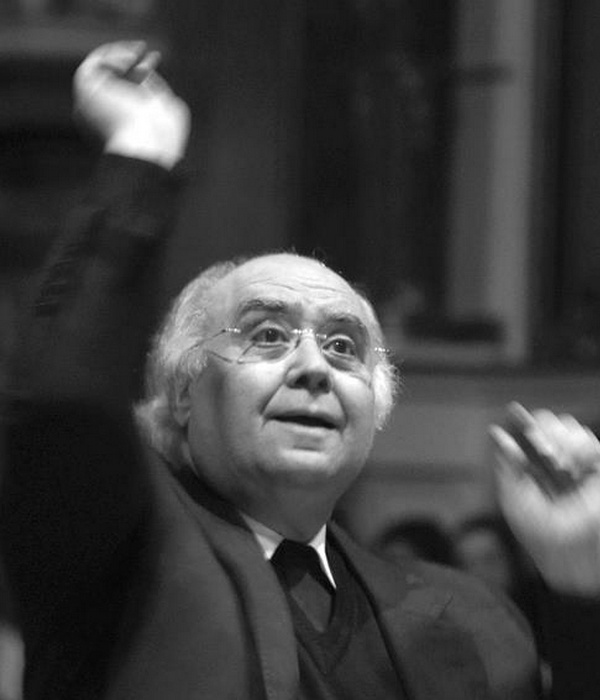
At the end of the 1950s, in Lisbon, more specifically at the Church of Santa Maria de Belém/Mosteiro dos Jerónimos, there had already been a first attempt to implement the movement, on the initiative of Maria do Rosário Rocha e Melo, with the creation of a choir of young singers conducted by Celso de Almeida Correia. This choir, which copied the French choir Petits Chanteurs a la Croix de Bois, the first driving force behind the international Pueri Cantores movement, even adopting the same white robes with a wooden cross, did not last a decade.
In 1992, António Ferreira dos Santos, who by then had extensive experience as president of the National Sacred Music Service and was also a skilled composer of liturgical music, promoted a large national gathering in Fátima, in which dozens of choirs of young singers participated. He even managed to bring Siegfried Koesler and Wim Buys, respectively president and secretary of the International Federation of Pueri Cantores (FIPC), to the Paul VI Pastoral Center. Although this meeting, which was intended to establish a Portuguese federation, did not have the expected legal follow-up, it reinforced the Church’s conviction in Portugal of the benefits of liturgical choral practice by young singers; from an international point of view, it turned the spotlight on what was emerging in Portugal. Since then, the presidents of the FIPC, especially Josep Maria Torrents (2000-2009) and Mons. Robert Tyrala (2009-2017), have maintained a strong interest in the nascent Pueri Cantores movement in Portugal.
The Portuguese Federation was legally established in Santarém in 2015, on the initiative of four choirs – Coro Infantil de Eiriz “Amigos de Jesus”, Pueri Cantores São Cristóvão de Ovar, Pueri Cantorum Associação Cultural, and Schola Cantorum da Catedral de Santarém – at a meeting attended by Mons. Robert Tyrala and Josep Maria Torrents, representing the International Federation, as well as Father Pedro Miranda, representing the National Sacred Music Service.
Currently, the presidency of the Portuguese Federation is held by David Paccetti Correia, music director of the Schola Cantorum of Santarém Cathedral, assisted by Johnny Silva, executive director of the Children’s and Youth Choir of the Parish of Beiriz. The chaplaincy is held by Fr. Joaquim Augusto Ganhão, director of the Schola Cantorum of Santarém Cathedral.
The Portuguese Federation of Pueri Cantores, recognized by the Portuguese Episcopal Conference, is a branch of the International Federation of Pueri Cantores. It provides training support to its member choirs, gives them access to international congresses specific to this movement, and promotes national meetings (Fátima 2020; Santarém 2023). The next national congress is scheduled to take place in Porto in 2026.
It is therefore with great joy that the FPPC will pay a fitting tribute on October 26 to Cónego Ferreira dos Santos, a man of God who played such an important role not only in sacred music in Portugal but also in the dawn of the Pueri Cantores movement in our country.
